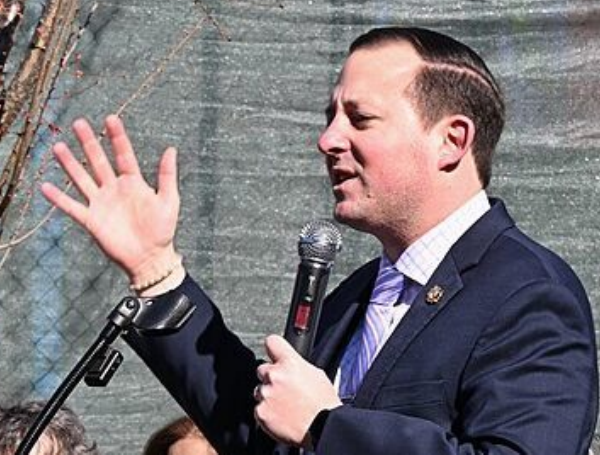
Democratic Maryland Senate President Bill Ferguson is backing legislation to strip trash incinerations from the state’s renewable energy subsidy program — a policy shift that could directly benefit the solar company that now employs him.
Lawmakers are quietly folding the proposal into a broader energy package set for a vote before the legislature adjourns Monday. If it passes, millions in taxpayer-funded renewable energy credits could be redirected from waste-to-energy plants to solar firms like CI Renewables, where Ferguson took a job last year.
READ: California Sen. Adam Schiff Says Harris Lost Race Due To Being ‘Status Quo’ Candidate
Ferguson, of Baltimore, announced in June that he had accepted the job with CI Renewables, a company that finances and develops large-scale solar projects in Maryland and along the East Coast. He retained his leadership position in the state Senate, where he now holds near-total control over which legislation advances.
Ferguson told the Daily Caller News Foundation his employment did not violate any ethical rules, and that “most all of [Maryland lawmakers] have outside jobs. So just like we have a doctor in the Senate who works on healthcare issues — the theory of a part-time legislature is that you bring expertise into the long legislative process.”
“Before I even considered this position with CI [Renewables], I spoke to our ethics council,” Ferguson continued. “I made sure we had clear lines of where problems could arise in the case that there was something in Maryland, and I disclosed it all through all of our public filings. We’ll continue to always disclose it — it’s something that’s really important … can’t be in a way that’s personally beneficial, and we maintain very strict ethics rules here in Maryland.”
READ: CNN’s Jake Tapper Clashes With Cabinet Secretary Over Trump’s Tariffs
The full package, called the Next Generation Energy Act, is expected to be taken up in the coming days — likely before the session gavels out Monday. Lawmakers are advancing the proposal as part of a larger legislative vehicle, allowing it to move forward despite missing the usual procedural deadline.
In October, Ferguson posted on X that he would introduce a bill to remove trash incinerators from Maryland’s Renewable Portfolio Standard (RPS). Environmental groups who have long sought such a move argue waste-burning plants should not qualify for clean energy subsidies.
By removing incinerators from the RPS, solar companies would face less competition for lucrative state subsidies. The Maryland government doles out these subsidies via renewable energy credits (RECs) that divert state-mandated green energy spending away from waste-burning facilities and toward solar developers — like Ferguson’s employer. There are 208 solar companies operating in Maryland as of 2024, according to the Solar Energy Industries Association.
Though the bill failed to meet the General Assembly’s “crossover deadline” — typically a death knell for legislation — Ferguson’s office now says it’s being folded into the Next Generation Energy Act, the sweeping omnibus bill that must be finalized before Monday. The state Senate president is playing a central role in shaping this package.
READ: Legal Experts Raise Questions On Obama-Appointed Judge Blocking Trump’s Deportations
“The [CI Renewables state contracts] are pre-established before I came on board. But I’m largely not on, sort of, the deal side of it. I’m, sort of, a general counsel role. So I do a lot of the legal leasing review and PPA agreement — that sort of legal agreement side of the house,” Ferguson said of his involvement with CI Renewables’ state contract negotiations.
The company markets itself as a turnkey solar provider that works directly with state and local governments, including through power purchase agreements — long-term deals that often hinge on state-level tax incentives or credits.
At the center of the policy battle is Baltimore’s Wheelabrator incinerator — responsible for 36% of all industrial air emissions in Baltimore, according to Clean Air Baltimore. Environmental organizations such as Clean Air Baltimore have lobbied for years to eliminate the plant’s eligibility for RECs, arguing it props up an outdated and dirty form of energy.
READ: Poll: Trump Approval Rises Despite Controversy Over New Tariffs
“If you look in Europe, actually, waste incineration is a large component of their refuse cycle, but they operate with much cleaner, technologically advanced facilities than we have here in Maryland,” Ferguson said. “If we could get rid of waste incineration, I would be totally for it. But there are real consequences about what you do with the rest of the waste cycle, and what that means for landfills — ideally we can figure out a longer term plan.”
Incinerator operators and labor unions argue the Wheelabrator plant provides union jobs — 65 jobs as of 2019, according to The Real News Network — helps reduce landfill waste and generates baseload electricity, Maryland Matters reported. Removing it from the subsidy program, the operators and unions say, could push the facility toward closure, eliminating local jobs and increasing trash exports to other states.
“[Incineration and solar] are both called renewable energy under the current paradigm in Maryland, but the waste-to-energy incineration issue has been something I’ve been very much against since it started,” Ferguson continued. “I was first elected in 2011 and it was one of the first bills I ever voted on against leadership was when incineration was added as a tier-one renewable source.”
Behind the scenes, lobbyists for waste-to-energy companies are preparing to mount a last-ditch effort to block the bill’s inclusion in the final energy package, according to Maryland Matters.
Please make a small donation to the Tampa Free Press to help sustain independent journalism. Your contribution enables us to continue delivering high-quality, local, and national news coverage.
Connect with us: Follow the Tampa Free Press on Facebook and Twitter for breaking news and updates.
Sign up: Subscribe to our free newsletter for a curated selection of top stories delivered straight to your inbox.

First published by the Daily Caller News Foundation.